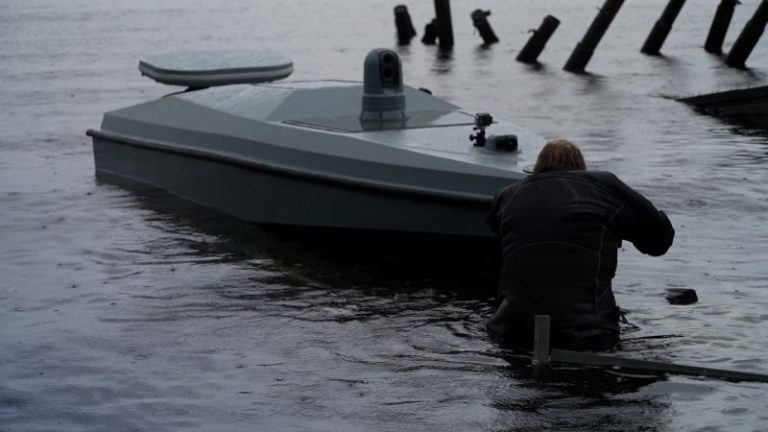At a secret makeshift military base a nondescript van and pickup truck tow two gray objects covered by tarpaulin mounted on trailers.
In the driving rain, they resemble something more akin to a Boston Whaler, rather than hiding one of Ukraine’s most closely guarded secrets.
As the tarps are drawn back, a gun-gray, sleek hull appears. Just over five meters (16 feet) in length, its narrow shape resembles a wide canoe.
These naval drones, never before shown to journalists, are increasingly allowing the Ukrainians to attack and surveil the Russians in the Black Sea and on the Crimean Peninsula. A country with no real fleet to speak of is outmanned and outgunned off their own coastline, but these sea drones are proving a vital tool in countering the Russians.
A government-linked Ukrainian fundraising organization called United24 has sourced money from companies and individuals all around the world, pooling the funds to disperse it to a variety of developers and initiatives from defense to soccer matches.
On a creaky wooden jetty, a camouflaged sea drone pilot says he wants to go by “Shark.” In front of him is a long black hardshell briefcase. He unveils a bespoke, multi-screened mission control – essentially an elaborate gaming center, complete with levers, joysticks, a monitor and buttons that have covers over switches that shouldn’t be accidentally knocked, with labels like “blast.”
The developer of the drone, who asked to remain anonymous, said their work on the sea drones only began once the war started. It was “very important, because we did not have very many forces to resist the maritime state – Russia. And we needed to develop something of our own, because we didn’t have the existing capabilities”.
Battles in the Black Sea
Ukraine is now starting to show those capabilities, even if missions are have varying degrees of success.
Multiple sea drone attack carried out on Russian assets in Crimea and the Black Sea have grabbed recent headlines, with dramatic videos posted online. Some, but by no means all, have been claimed by the security services themselves.
On 14 July the Ukrainian security services, alongside the navy, claimed joint responsibility for the second attack in nine months on the much-derided Kerch Bridge.
The vital artery, a nearly $4 billion project by Russia and personally opened by President Putin, is a key target to disrupt and sever the resupply route for Russian forces in the illegally annexed peninsula and in occupied areas of the southern front.
The pre-dawn attack left a section of the bridge unpassable and out of service until September.
The developer, watching his brainchild churn water, says the “these drones are a completely Ukrainian production. They are designed, drawn and tested here. It’s our own production of hulls, electronics and software. More than 50% of the production of equipment is here (in Ukraine).”
The Russians have yet to adjust to Ukraine’s newest capabilities, they claim.
“It is very difficult for them to get into such a small drone, it is very difficult to find it,” the developer says. “The speed of these drones exceeds any sea craft in the Black Sea region at the moment.”
The speed and difficulties in detection may go some way to explaining how the drones that attacked the bridge traveled undetected in the dark across the Black Sea to the bridge.
Targeting flagships
Ukraine has also been aiming their new equipment at Russia’s Black Sea Fleet, which has cruised menacingly off the coast and become a recipient of many vicious volleys of missile attacks.
Before the recent attack left a key piece of Russian infrastructure bruised, other attempted attacks had already put the Russians on notice.
There was never any real proof given to the damage caused to the vessel, and it later reappeared without any major damage, but the fact that the Ukrainians were able to get within striking distance of the Admiral Makarov reinforces the success rate of the Ukrainians.
The brazen attack also gave Kyiv’s forces a boost and some propaganda for the public. Especially since the Admiral Makarov was newly installed as the Black Sea flagship after the Moskva was famously sunk by Ukrainian forces in April 2022.
“Shark,” languidly guiding the sea-drone from his control station, says :”these drones are designed to destroy ships and the fleet… such things that are used quite successfully and terrify the Russians.”
The damage sustained to the Admiral Makarov was unclear, but the intentions for Kyiv were on show.
The developer argues their work in against Russian naval targets forces them further into the Black Sea, therefore making deeper missile strikes into Ukraine harder. “300, 400, 600 kilometers is a long distance that makes some operations impossible and makes other operations more difficult.”
He said that makes cities like Odesa “safer.” But after the bridge strike, the city came under days of intense air attacks from drones and cruise missiles launched from the Russian Black sea fleet. Twenty-five UNESCO World Heritage sites across the city were hit. Russia claimed it was responding to an area it says was housing sea drones.
The drones’ capabilities and successes have given the developer some bravado though
“I think it will be five to 10 years or more before they (Russians) can effectively counter this type of equipment,” he says. “Their equipment is from the 20th century, ours is from the 21st. There are 100 years between us.”

